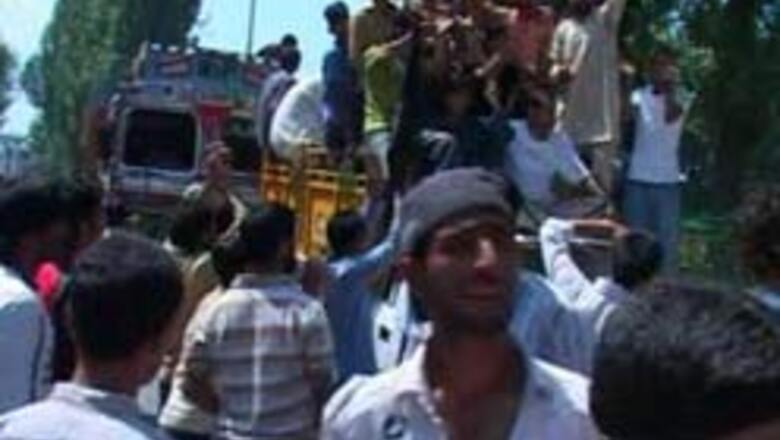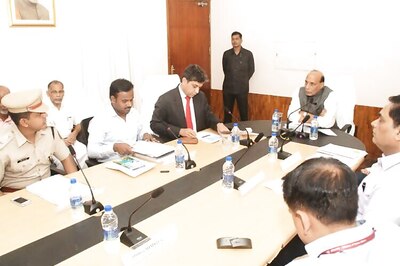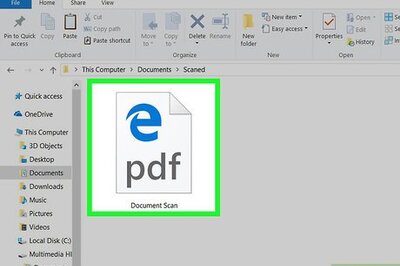
views
Srinagar: One person was killed and nearly 50 were injured as mobs defied curfew and fought pitched battles with security forces in parts of a tense Kashmir Valley Sunday.
Curfew was imposed in cities and towns of the valley early Sunday in an attempt to foil a planned march to Srinagar Monday by separatists, but large crowds took to the streets brazenly defying the authorities.
Clashes took place in Srinagar, the tense summer capital of Jammu and Kashmir, and in the towns of Handwara, Baramulla and Beerwah of the valley.
A man was killed and his son critically wounded in a firing allegedly by a security force squad in Srinagar.
Sources told IANS that Gulam Qadir Hakim and his son Muhammad Yaqoob moved out of their Buchwara home, two km from city centre Lal Chowk, for buying foodstuffs during the curfew restrictions.
“They had gone to buy milk in the evening when they were fired upon by the security forces without any warning,” residents of the area told IANS by phone.
While the father succumbed to injuries after he was taken to a hospital, Yaqoob was reported to be in a critical condition.
A spokesman of the police, however, said the father-son duo were part of a curfew- defying mob that indulged in violence against the security forces.
Violence also erupted at Beerwah, 45 km from here, where 25 people were injured, and in Baramulla, 54 km from here. In both places, young men took on the police and the Central Reserve Police Force (CRPF).
In Handwara, six people suffered bullet wounds but it was not clear who had fired.
In Baramulla's old parts, seven protesters were hit by rubber bullets when security forces opened fire to disperse a large gathering that attacked them with stones and other missiles.
The strength of the crowds was put at hundreds in most places.
"The security forces used batons and tear smoke to disperse the protesters who kept on regrouping in hundreds," a police officer told IANS. "At least 15 people, including some security men, were wounded in Handwara."
Curfew was imposed throughout the valley by the authorities Sunday morning in order to foil Monday's separatist march to Lal Chowk.
An official statement said that the curfew had been imposed following "credible inputs that vested interests were planning to target the senior separatist leaders during (the) march to Lal Chowk".
Mirwaiz Umar Farooq, the chairman of the moderate separatist Hurriyat Conference, trashed the official claim and vowed that Monday's march would be held despite curfew.
“We have no such threat,” the Mirwaiz said, asserting that the authorities had been unnerved by the massive public response to the calls given by the separatist Kashmiri leadership.
The present turmoil in the valley started against the allotment of 40 hectares of forest land to a Hindu shrine board that manages the affairs of the annual pilgrimage to the Amarnath cave shrine in south Kashmir's Anantnag district.
The land allotment order was later revoked by the authorities, triggering counter protests in the state's Hindu-dominated Jammu region.
At least 40 people have been killed, mostly in police and paramilitary firing, in Jammu and Kashmir in the last almost three months of turmoil.
The unrest in the valley has turned into a mass separatist campaign, resurrecting the demands of Kashmir's secession from India that was most visible on the streets in 1989-90.
On Friday, the separatists took out a massive march to the Eidgah grounds in the old city area of Srinagar, joined by tens of thousands.
In the last fortnight, the authorities had been allowing the separatist marches and protests without any effective intervention from the security forces.
On August 11, in the first separatists' attempt to march to Pakistan-administered Kashmir, five protesters, including senior separatist leader Sheikh Abdul Aziz, were killed in police firing in Baramulla.
Even though the administration maintains the situation is under control, the army has been asked to standby for assistance to the civil authorities to face any eventuality.
Meanwhile, the district administration in Srinagar banned current affairs programmes on local TV channels, blaming them for airing inflammatory news and viewpoints.
Citing "absolutely imperative" reasons, an official spokesman said the situation was carefully assessed by the administration before taking the action under law against these channels in the larger public interest and for maintenance of order.



















Comments
0 comment